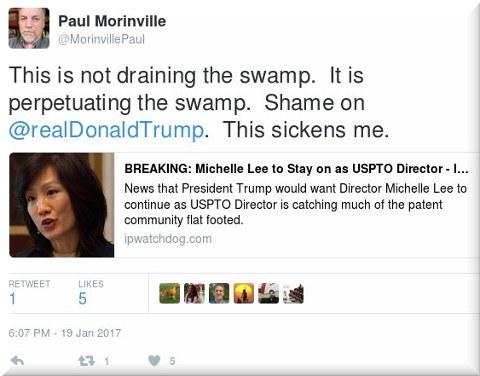

WE previously gave examples of shame-lobbying for UPC, e.g. in Germany by IAM. That subject will be revisited later on when we publish a series about the UPC. We have been seeing the same thing, however, also in the United States. IAM, which loves patent maximalism (it is promoting software patents, too), has played a key role in the attacks on Michelle Lee. It also promoted if not lobbied for Randall Rader as a replacement to her. Such despicable moves, with despicable proposals on behalf of the despicable Rader (look back at his disgraced history), are the type of things we'll never forget.
"Such despicable moves, with despicable proposals on behalf of the despicable Rader (look back at his disgraced history), are the type of things we'll never forget."Watchtroll meanwhile smears the US Supreme Court for merely improving the patent system, by improving quality. Failing to grasp that software patents ARE what he labels the "weak patents", Gene Quinn also shames some other entities. It's a sad shame that a person who doesn't even know how computer programs work keeps promoting them by insulting judges, insulting PTAB (appeal boards) and so on... Watchtroll is a special case, as it has become an attack site which smeared Lee at least half a dozen times (that we have kept track of).
The patent propaganda site, IAM, views companies as nothing but a pile of patents (this new article has it all over the headline alone) and days ago it said "[e]xpect extreme lobbying from all quarters as a result," in relation to Lee. Who has been behind this "extreme lobbying" if not IAM, Watchtroll and the likes of them? And watch their highly loaded headline, "The Trump administration's USPTO silence tells us all we need to know about its patent priorities" (as if they insult the administration for not caring at all about patents). Here is a key part:
Well, I wonder if that silence tells us all we need to know. It was over six weeks ago that the new US leader was sworn in and during that entire time there has been no word from the USPTO about who is in charge at the agency. The very strong rumour just before inauguration day was that Michelle Lee was to carry on in the job – and that does seem like it may now be the case; but if it is, there has been no confirmation. All attempts to find out where things stand have been met with a firm no comment from USPTO spokespeople who, you must imagine, are as frustrated as the rest of us about their inability to say more.
"It's not news but lobbying disguised as constructive advice. At whose behalf? Look at the income sources of IAM."In other (fake) news from IAM, here is another new headline: "The Trump administration sees IP-driven profits as a top trade priority; but it should look closer to home too"
IAM, herein, keeps using "China!" to lobby Trump. It's not news but lobbying disguised as constructive advice. At whose behalf? Look at the income sources of IAM. It's like a pressure group, yet it's syndicated by Google as though it is "News".
"It's like a pressure group, yet it's syndicated by Google as though it is "News"."What China is doing right now (broadening patent scope) is a very bad move which will prove regrettable. It's bad for Chinese people. Bastian Best, linking to Watchtroll, repeats/amplifies the "China!" lobby (those calling for patent maximalism "because China!"). I kindly asked him to read about the pitfalls such a move would entail, negatively impacting both Chinese and American people. I don't know if he is receptive to opinions that don't favour his bottom line, but I certainly hope so. He is at least very courteous.
Speaking of China, see this new article from LexField Law Offices. It's not hoax for April 1st but repetition of a subject we covered here before, namely:
On March 1, 2017, the State Intellectual Property Office of China ("SIPO") of China announced formal amendments to its Patent Examination Guidelines. The formal amendments are almost the same as the version SIPO previously published for public comments last year. The amendments will take effective as of April 1, 2017 (and it remains to be clarified whether and how the amendments will be retrospectively applied to existing patent applications and patents).
Just a couple of weeks back, IAM reported on a Singapore government proposal which suggested that the city-state may consider attracting or creating its own IP commercialisation entities. During last Friday’s IPBC Southeast Asia – our first conference focused on the region – IP Office of Singapore (IPOS) chief executive Darren Tang made clear that he is a big believer in IP monetisation as a way for companies to realise their full value creation potential. Most companies in the region may be far off from monetising large patent portfolios, but they revealed many other reasons why they are getting serious about IP.